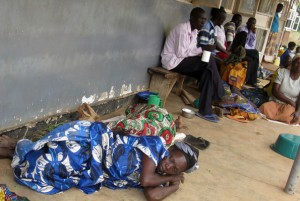By SOLOMON ARINAITWE & ANGELLA NALWANGA
When Goretti Kajumba, 33, checked into a maternity suite at Mulago Hospital on December 3, 2012, she was full of optimism and joy, awaiting the birth of her first born.
However, the joy would soon be eroded by agony and frustration as her baby girl mysteriously went missing, minutes after birth.
The hospital insists the baby was born in “distress” and died soon after birth.
Ms Kajumba, on her part, says the baby was doing well and could have been sold by unscrupulous health workers. Her case becomes more baffling when she reveals that she was not shown the body of the baby, despite repeated requests to hospital staff.
“They [doctors] told me that the body was buried by KCCA but when I went to the mortuary, there was no such record. I have been asking doctors about my child but they kept on confusing me until I went to the director and told him that sir, you are a father, where is my baby?” a distressed Kajumba, weeping inconsolably, told journalists yesterday at Mulago hospital.
An Inpatient Discharge Form (IDF) signed by Dr Lubega shows that Ms Kajumba gave birth to a baby girl of 3kgs, with a rating of 9/10, on December 3, 2012 and was discharged on December 7, four days later.
However, Dr Baterena Byarugaba, the executive director Mulago hospital, who has been handling the case, says there “was a mix-up in documentation and that is why the baby was not recorded as dead” on the form.
“She underwent a Caesarian Section and gave birth at around midnight but the baby was taken to the special care unit and the mother to the High Dependence Unit because they both had breathing problems,” Dr Byarugaba explains.
He adds that the baby died in the SCU while the mother recuperated after a dose of intravenous fluids and blood injections.
Dr Byarugaba notes that the mother was admitted without a helper who could have assisted the hospital in indentifying the dead child.
After failing to make headway, the mother reported the case to Inspector General of Police Kale Kayihura, who in turn directed the Commander Kampala Metropolitan police Felix Kaweesi, to take up the matter.
Mr Kaweesi yesterday met the directors of the hospital and the latter agreed to co-operate in the investigations.
Source: http://www.monitor.co.ug/News/National/Mother–Mulago-in-dispute-over–missing–baby/-/688334/1725002/-/t5uw7r/-/index.html

